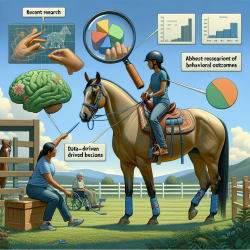In the evolving landscape of online therapy, staying informed about current research is crucial for improving therapeutic outcomes. One pertinent study, "Prevalence and health consequences of nonmedical use of tramadol in Africa: A systematic scoping review," offers insights that can be instrumental for practitioners. Although the study focuses on the misuse of tramadol, the methodologies and findings can guide speech-language pathologists (SLPs) in refining their practices.
Here are key takeaways from the study and how they can be applied to enhance online therapy services for children:
1. Emphasize Data-Driven Decisions
The study utilized a systematic scoping review to gather and analyze data, ensuring the reliability and replicability of its findings. SLPs can adopt similar rigorous data collection and analysis methods to track the progress and outcomes of their online therapy sessions. By doing so, practitioners can make informed decisions, tailor interventions, and measure effectiveness accurately.
2. Understand Population-Specific Needs
The research identified different subpopulations affected by tramadol misuse, highlighting the importance of understanding specific needs. Similarly, SLPs should consider the unique needs of each child. This can involve customizing therapy plans based on individual assessments and continuously updating these plans as the child progresses.
3. Address Underlying Factors
The study found various physical, psychological, social, and economic reasons behind tramadol misuse. While these factors may not directly relate to speech therapy, understanding the broader context of a child's life can help SLPs provide more holistic care. For instance, recognizing stressors or environmental factors that may affect a child's communication skills can lead to more effective interventions.
4. Implement Preventive Strategies
Just as the study suggests targeted interventions for different groups, SLPs can develop preventive strategies to address potential challenges in therapy. This might include early identification of speech and language issues and proactive engagement with parents and teachers to create a supportive environment for the child.
5. Foster Collaboration
The research underscores the need for a multi-disciplinary approach to address tramadol misuse. In online therapy, collaboration with other professionals such as teachers, psychologists, and pediatricians can enhance the overall care plan for the child. By working together, practitioners can ensure comprehensive support for the child's development.
6. Continuous Professional Development
SLPs should stay updated with the latest research and best practices. Engaging in continuous professional development and being open to new methodologies can improve therapy outcomes. The findings from the tramadol study can inspire SLPs to explore new areas of research that can benefit their practice.
Encouraging Further Research
While the study provides valuable insights, it also highlights the need for further research into the social and economic costs of drug misuse. Similarly, SLPs should advocate for and participate in research that explores the long-term impact of online therapy on children's communication skills and overall development.
To read the original research paper, please follow this link: Prevalence and health consequences of nonmedical use of tramadol in Africa: A systematic scoping review.










